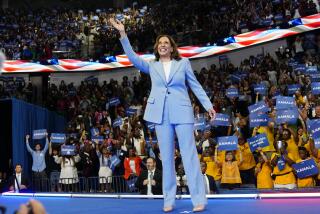Primaries Continue Despite Little Attention
- Share via
Al Gore and George W. Bush, nominees-in-waiting in the battle for the White House, began playing out the string of presidential primaries in Colorado and Utah on Friday. The two already are campaigning against each other for the national election, with 24 state primaries still to come.
The two Western primaries and a straw poll in Wyoming didn’t attract much attention after Republican challenger John McCain suspended his effort and Democrat Bill Bradley bowed out of his.
At one Salt Lake City polling place, only five people cast ballots during the first hour and 45 minutes. “Nobody cares,” said Clayton Hurst, an election judge.
Still, there were delegates to be won--91 for the Republicans, 75 for the Democrats--to push Bush and Gore closer to the national convention majorities that will ratify the primaries that were settled in only six weeks, when both men won overwhelmingly in the 16 contests of Super Tuesday. Gore swept, Bush won all but four GOP contests and both races were essentially over.
Bush went into Friday’s primaries with 617 of the 1,034 delegates needed to win the nomination.
Gore had 1,479; it takes 2,170 to install the Democratic nominee.
There is one Republican still campaigning against Bush, former Reagan administration official Alan Keyes, who contends that the Texas governor can’t stand up against Gore.
“The fact that folks in one state don’t make the right choice doesn’t mean it shouldn’t be available for people in other states,” Keyes said.
Keyes, a staunch conservative, has won 12 delegates so far.
Bush and Gore were evenly matched in a Time/CNN poll released Friday, Gore with the backing of 48% of registered voters and Bush with 46%. The poll, taken after Tuesday’s results, also showed the two candidates closely matched on public perception of their strengths as candidates.
Exit polls from Colorado and Utah showed voters mostly satisfied with a Bush-Gore matchup in November. Fewer than a fifth said they would consider a third-party candidate.
Voters were surveyed as they left the polling places by Voter News Service, a consortium of Associated Press and television networks.
Along with the delegates, the rest of the primary schedule offers something of a framework for the national campaigns.
There are primaries in other major states that will be keys to the general election, among them Illinois on March 21, Pennsylvania on April 4 and New Jersey on June 6.
More to Read
Get the L.A. Times Politics newsletter
Deeply reported insights into legislation, politics and policy from Sacramento, Washington and beyond. In your inbox twice per week.
You may occasionally receive promotional content from the Los Angeles Times.










